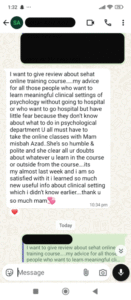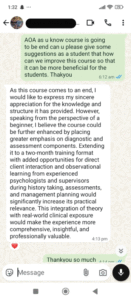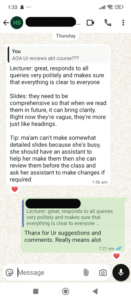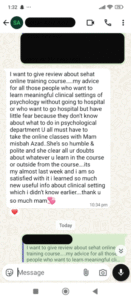
Intensive Training Course on Psychotherapeutic Interventions in children and Adolescents
- Starts From: August 2025
- 5 Classes Per Week - 40 Minutes Class
Clinical Skills: Child and Adolescents Psychopathology
COURSE OUTLINE
Module 1: Introduction to Child and Adolescent Psychopathology
- Definitions, prevalence, and classification systems (DSM-5-TR, ICD-11)
- Developmental considerations and risk factors
- Normal vs. abnormal development
- Overview of assessment process
Module 2: Interviewing Skills, tools and Techniques
- Structured vs. unstructured interviews
- Developmental History
- Practical Component:
- Role-playing child/adolescent clinical interviews
- Simulated parent interviews
- Observational checklists (e.g., CBCL)
Module 3: Psychological Testing in Children and Adolescents
- Type of tests
- Screening Tools (SDQ, MCHAT)
- Standardized Psychological Tests used with Children
(SCAS, KADS, Vanderbilt, WISC, Vineland, CPM, CARS)
- Practical Component:
- Practice scoring and interpretation
- Administering short tools in mock settings
Module 4: Neurodevelopmental Disorders
- ADHD, Autism Spectrum Disorder, Intellectual Disabilities
- Symptoms, Assessment and Management
- Use of Portage Guide
- Case presentations
Module 5: Internalizing Disorders
- Anxiety disorders (SAD, GAD, OCD), Depression
- Developmental expressions of internalizing symptoms
- Symptoms, Assessment and Management
- Practical Component:
- Role Playing
- Case Studies
Module 6: Externalizing Disorders
- Conduct Disorder, Oppositional Defiant Disorder, Disruptive Mood Dysregulation
- Role of Parenting, Family dynamics
- School dynamics
- Practical Component:
- Role-play techniques
EVALUATION COMPONENTS
- Participation in practical exercises and role plays
- Quiz after completion of each module
- Test Scoring and test Administration
Batch Duration: 1 Month
Date Starts: August2025
Who can Join: Students of Clinical Psychology from HEC recognized University Practitioner of Clinical Psychology in formal/private settings.
Mode of study: Virtual (ZOOM/Google meet)
Classes: 5 Classes Weekly
Meet The Trainer

Misbah Nousheen
Consultant Clinical Psychologist/ Child and adolescent mental health Specialist
Experience: 12 Years
Mrs. Misbah Nosheen is working as a Clinical and Child Psychologist for more than 12 years. She is an expert in understanding, diagnosing, and managing mental, emotional, and behavioral issues in children and adolescents. She works with children, parents, and schools to create supportive environments and develop strategies that help children navigate various challenges. She can professionally use various methods like clinical interviews, observations, and standardized tests to evaluate mental health, cognitive abilities, emotional well-being, and behavioral issues. She has been proficiently managing issues in children and adolescents and sing various evidence-based interventions such as play therapy, behavioral therapy, family therapy, Parent child interaction therapy, Cognitive behavioral therapy and counseling.




















